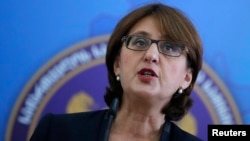Georgian Foreign Minister Maja Panjikidze resigned on Wednesday over what she called threats to the ex-Soviet republic's pro-Western policies, deepening a crisis in the coalition government.
A junior minister overseeing integration with Europe also quit, a day after Prime Minister Irakly Garibashvili fired his Western-leaning defence minister and one of the six parties in the ruling Georgian Dream coalition threatened to pull out.
The Free Democrats' departure would strip the coalition of a majority in parliament, increasing political instability in the country of 4.5 million which is crossed by pipelines that carry Caspian oil and gas from Azerbaijan to Europe.
Defense Minister Irakly Alasania had irked Garibashvili by saying the arrests of several officials in his ministry were politically motivated and intended to undermine supporters of better relations with the West.
"Georgia's Euro-Atlantic integration is the most important thing for me and my team," Panjikidze told a news conference at which she said four deputy ministers were quitting with her.
"My team and I cannot hide the threats that our country faces now," she said without giving any details.
Panjikidze said she was quitting Georgian Dream, and Alasania's Free Democrats were expected to decide later on Wednesday whether to follow suit.
Alexy Petriashvili, State Minister for European and Euro-Atlantic Integration, tendered his resignation by letter to Garibashvili, carrying out an earlier promise. He is also a member of the Free Democrats.
Garibashvili said suggestions by Alasania and Panjikidze that the South Caucasus country's pro-Western foreign policy was under threat were unfounded.
"Our foreign policy course is unchanged. It is irreversible," he said in a statement. "Those ridiculous and naive statements of course will have no effect at all."
Balancing act
The tensions in the coalition highlight Georgia's difficulties trying to pursue its goals of joining NATO and the European Union without antagonising its former Soviet overlord Moscow, with which Tbilisi fought a five-day war in 2008.
Georgia signed an agreement with the EU in June which deepened political and trade ties and has long been a U.S. ally, but relations with Moscow are strained and Tbilisi has watched carefully as the crisis in Ukraine unfolded.
Russia annexed Ukraine's Crimea peninsula in March and still occupies the Georgian regions of Abkhazia and South Ossetia, over which the countries went to war in 2008.
Garibashvili said Mindia Janelidze, secretary of a council overseeing security, will replace Alasania as defence minister.
Alasania's Free Democrats have 10 of the coalition's 83 seats in the 150-seat parliament. Its departure could make it reliant on independent deputies for a majority but a confidence vote must be called only if seven or more of the 20 cabinet members are replaced.
President Georgy Margvelashvili says the crisis poses "a threat to the efficient functioning" of state institutions and to Georgia's quest for Euro-Atlantic integration.
Western countries have expressed concern that the Georgian Dream government, first formed under billionaire Bidzina Ivanishvili in 2012, has persecuted political opponents and used selective justice against them.
Dozens of ex-officials, including a former prime minister, defense and interior minister and the mayor of the capital Tbilisi, have been arrested on charges such as abuse of power and corruption since the coalition came to power.





